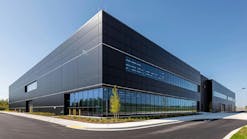One of the biggest trends in the security industry in recent years among hardware vendors and service providers alike has been increased consolidation — as companies look to increase their share of the pie in a market that remains highly fragmented. On Monday, systems integration giants Johnson Controls and Tyco became the latest household names in security to join the growing list of companies that have come to embody this trend, as they announced plans to merge the two organizations.
Johnson Controls and Tyco will be combined under Tyco International plc, which will be renamed "Johnson Controls plc." Upon the closing of the transaction, the combined company will maintain Tyco’s Irish legal domicile and global headquarters in Cork, Ireland. The company’s primary operational headquarters for North America will be in Milwaukee, where Johnson Controls is based. The deal is expected to close by the end of 2016.
As expected, company officials touted the potential power and reach of such a large combined entity. "This combination uniquely positions us to provide the most comprehensive portfolio of building and energy solutions," Alex Molinaroli, chairman and CEO of Johnson Controls, said on a conference call announcing the deal on Monday. "It is a highly strategic combination and it creates a leading, full-building products and services company bringing together the best-in-class technology and service capabilities across fire, security, controls, HVAC and energy storage."
Molinaroli said the companies have highly complementary businesses and geographic footprints, which will provide the new Johnson Controls with tremendous growth opportunities moving forward. For example, while Johnson Controls has a strong and growing presence in China and Asia, Molinaroli said Tyco is much stronger in Europe. "We really believe we can achieve more together than we could on a stand-alone basis," he added.
Tyco CEO George Oliver said on the conference call that he thought the company should not be limited to just the fire and security market in the development of products and services. Oliver believes leveraging Johnson Control’s leadership in building controls, HVAC and with energy storage in conjunction with Tyco’s dominance in fire and security will better enable the new company to more completely address the problems of end users in the future.
“Drawing upon the strengths of each company, this combination represents a unique opportunity to expand our ability to serve our customers while offering a compelling value creation opportunity for our shareholders,” said Oliver.
Because they already provide some of the most critical building management systems, Oliver said the company will be well-positioned to take advantage of “megatrends” in the market, such as the Internet of Things — to be able to “own the building” so to speak. “We will be the one-stop-shop in building products, services and technology that can serve their needs holistically,” he said.
Industry Impact
According to Paul Bremner, senior analyst for video surveillance and security services at research firm IHS, the merger will significantly enhance Johnson Controls’ global market share. IHS’ Physical Security Channel Intelligence Service estimated that Tyco Fire & Security was the largest security system integrator in the world, while Johnson Controls was ranked as the 10th largest.
“The market was estimated to be worth $62 billion in 2015, growing at rates above 6 percent through to 2020,” Bremner said. “This merger would create an integration company which would have a global market share above 5 percent, a significant feat in an industry which is highly fragmented.”
Besides creating a colossal worldwide security integration entity, most security professionals — whether they are end-users or they represent the channel — are interested in how this may affect the industry as a whole. While the renaming of the combined company under the Johnson Controls brand has led some to speculate about the future of the Tyco brand itself, Tyco spokesman Stephen Wasdick said it will remain a vital part of the company’s identity moving forward.
“We are in the process of developing a comprehensive brand strategy but plan to leverage brands of both companies in places where the brands are valuable. We anticipate that the Tyco brand name will be a key part of the new company’s combined fire and security business,” said Wasdick.
Jim McHale, director of UK-based market research firm Memoori, believes the deal especially bodes well for Johnson Controls given Tyco’s strength in the security space.
“I believe Johnson Controls will be very happy to get their hands on Tyco's Fire and Security portfolio,” McHale continued. “Johnson Controls has not kept up with the pace of innovation in fire and security — they remain strongest in building management systems and HVAC controls,” McHale added. “Tyco, on the other hand, has been relatively busy in building up its business (through acquisition).”
Oliver said that Tyco has undergone a transformation over the last three years from being a holding company to an operating company that is focused on growth and innovation. Tyco most recently acquired VMS provider Exacq in 2013, and retail analytics companies such as ShopperTrak and FootFall. In addition to the brands/product lines McHale mentions, Tyco Security Products includes American Dynamics, Bentel Security, CEM, Software House, DSC, Kantech, Elpas, Sur-Gard, Visonic and C24, Tyco Integrated Security, SimplexGrinnell, Ansul, Scott Safety and Chemguard.
Moving forward, Bremner believes that consolidation will only increase with large, international integrators looking to acquire smaller, regional firms
“The security system integration market is characterized by a handful of large international players, numerous regional players, and a large amount of local players, perhaps serving a single city only. This merger has made that pool of large international players smaller still,” said Bremner. “I expect that we will see continued consolidation as the integration market continues to mature. It is likely that the large international players will look to smaller regional companies as acquisition targets, as these smaller regional companies have been experiencing higher growth rates over the past 2-3 years.”
Market and Corporate Impact
The newly combined company is expected to save at least $150 million annually in U.S. taxes as result of this move. These types of so-called “corporate inversions” — where companies relocate their legal domicile to a nation with a lower corporate tax rate — have become an increasingly popular strategy among U.S.-based businesses in recent years. The companies also expect to save $500 million in operating costs over the first three years after the deal is completed through increasing efficiencies, eliminating redundancies, and integrating their global branch networks.
“The primary motivating factors in this deal seem to be tax and financial synergies, the new company will be domiciled in Ireland with obvious tax benefits,” McHale said. “Both companies’ share price has fallen significantly over the last year, and I'm sure markets will see this as a positive move, counteracting Johnson Controls over exposure to the weakening Chinese market.”
Under the agreement, Johnson Controls shareholders will own approximately 56 percent of the equity of the combined company and receive aggregate cash consideration of approximately $3.9 billion. Current Tyco shareholders will own approximately 44 percent of the equity of the combined company.



